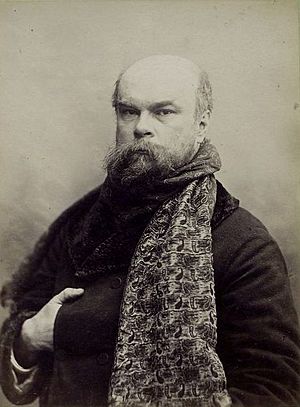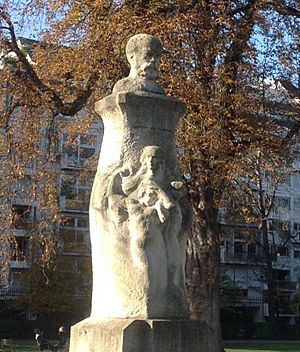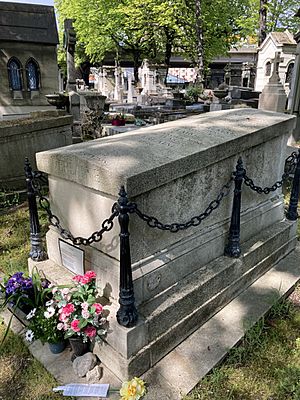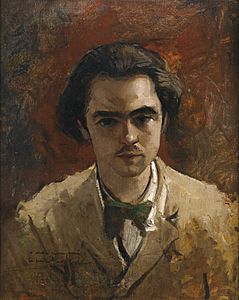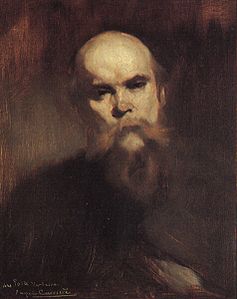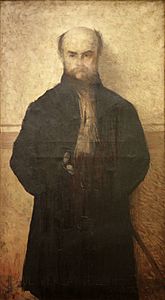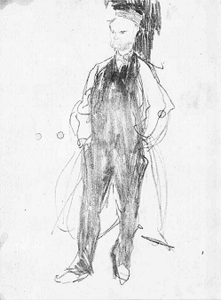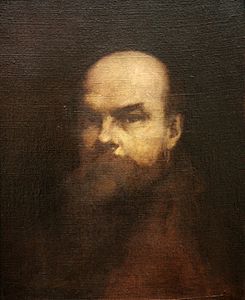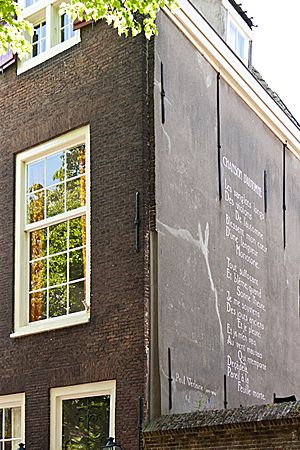Paul Verlaine facts for kids
Quick facts for kids
Paul Verlaine
|
|
|---|---|
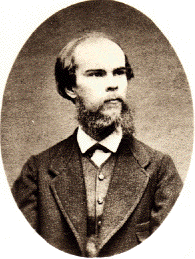 |
|
| Born | 30 March 1844 Metz, Lorraine, France |
| Died | 8 January 1896 (aged 51) Paris, France |
| Occupation | Poet |
| Genre | Decadent, Symbolist |
| Spouse | Mathilde Mauté (1870–1871) |
| Partner | Arthur Rimbaud (1871–1875) |
| Signature | |
 |
|
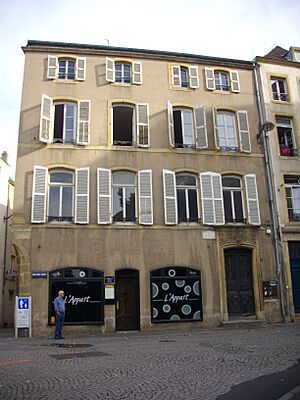
Paul-Marie Verlaine (born March 30, 1844 – died January 8, 1896) was a famous French poet. He is known for his connection to the Symbolist and Decadent movements in poetry. Many people see him as one of the most important poets of the late 1800s, a time often called the fin de siècle.
Contents
About Paul Verlaine
His Early Life and Poems
Paul Verlaine was born in Metz, France. He went to school in Paris at the Lycée Impérial Bonaparte. After finishing school, he started working for the government.
From a young age, Paul loved writing poetry. He was first inspired by a group of poets called the Parnassien movement. His very first poem was published in a magazine called La Revue du progrès in 1863.
Verlaine often visited important social gatherings. There, he met many famous artists and writers of his time. These included Anatole France, Emmanuel Chabrier, and Théodore de Banville. His first collection of poems, Poèmes saturniens, came out in 1866. Even though some critics had mixed feelings, this book showed he was a promising and original poet.
Marriage and Time in the National Guard
In 1870, Paul Verlaine married Mathilde Mauté. That same year, France became the Third Republic. Verlaine joined the 160th battalion of the Garde nationale. He became involved with the Paris Commune on March 18, 1871.
Verlaine became a leader in the press office for the Paris Commune. He managed to avoid the dangerous street fighting that happened later. He then went into hiding in a place called Pas-de-Calais.
His Friendships and Travels
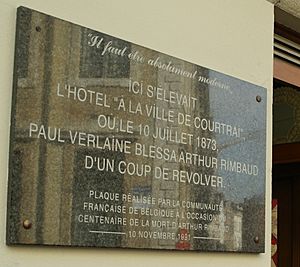
Verlaine returned to Paris in August 1871. In September, he received a letter from Arthur Rimbaud, another young poet who admired his work. Verlaine invited Rimbaud to Paris. By 1872, Verlaine spent most of his time with Rimbaud.
Verlaine and Rimbaud traveled together to London in 1872. Later, in Brussels in July 1873, Verlaine was arrested. He was then held in Mons prison. While in prison, he became a Roman Catholic again. This change in his beliefs influenced his later poems.
His collection of poems, Romances sans paroles (meaning "Songs without Words"), was written between 1872 and 1873. These poems were inspired by his memories of Mathilde and his travels with Rimbaud. The book was published while Verlaine was still in prison.
After he was released, Verlaine went back to England. He worked as a teacher for several years. He taught French, Latin, Greek, and drawing at schools in places like Stickney and Boston. He also lived in Bournemouth. During his time in England, he wrote another successful book of poems called Sagesse.
Verlaine came back to France in 1877. While teaching English at a school in Rethel, he became very fond of one of his students, Lucien Létinois. Lucien inspired Verlaine to write more poems. Sadly, Lucien died in 1883 from typhus, which greatly upset Verlaine.
His Later Years and Legacy
In his final years, Verlaine faced difficult times and lived in poverty. He often stayed in public hospitals. However, people began to rediscover his early poetry. His unique personality and art brought him renewed support and some income. In 1894, other poets in France chose him as their "Prince of Poets."
Verlaine's poetry was seen as new and exciting. It inspired many composers to create music. For example, Gabriel Fauré used Verlaine's poems for his song cycles Cinq mélodies "de Venise" and La bonne chanson. Claude Debussy also set Verlaine's poem Clair de lune to music. Other composers like Reynaldo Hahn and Poldowski also used his poems.
Paul Verlaine passed away in Paris on January 8, 1896, at the age of 51. He was buried in the Cimetière des Batignolles. In 1911, a statue of Verlaine was put up in the Luxembourg Gardens in Paris.
Verlaine's Poetic Style
Many French poems from the late 1800s were called "decadent." This was because of their unusual topics or how they looked at life. Verlaine himself used the term poète maudit ("cursed poet") in 1884. He used it to describe poets like Stéphane Mallarmé and Arthur Rimbaud. These poets often went against traditional poetry rules and were sometimes ignored by critics.
However, after 1886, the term symbolism became more common for this new style of writing. Verlaine, along with poets like Mallarmé and Rimbaud, became known as "Symbolists." These poets often explored themes like city life, dreams, and hidden feelings.
In Symbolist poetry, especially Verlaine's, the goal was to suggest ideas rather than state them directly. They wanted to create moods and feelings using the sound of words and the rhythm of the verses. Music was very important to their poetry.
Verlaine explained his style in his poem "Art Poétique." He said that musicality was most important. He also talked about using hints and "the Odd" in poetry. He advised poets to avoid harsh or overly clever words. Verlaine believed a poem should feel like a "happy occurrence."
Portraits of Verlaine
Many artists painted pictures of Paul Verlaine. Some of the most famous artists who painted him include Henri Fantin-Latour, Antonio de la Gándara, and Gustave Courbet.
-
by Frédéric Bazille
1867 -
by Eugène Carrière
1890
A Historical Fact
During World War II, before Operation Overlord (D-Day), the BBC used a secret code. They broadcast lines from Verlaine's 1866 poem "Chanson d'automne" on the radio. This was a signal to the French Resistance.
The first three lines, "Les sanglots longs / Des violons / De l'automne" ("Long sobs of autumn violins"), meant that D-Day would start within two weeks. These lines were broadcast on June 1, 1944. The next lines, "Blessent mon coeur / D'une langueur / Monotone" ("wound my heart with a monotonous languor"), meant D-Day would begin within 48 hours. This told the resistance to start their sabotage missions, especially on the French railways. These lines were broadcast on June 5 at 11:15 PM.
Verlaine's Works in French
Verlaine's complete works are available in special editions.
- Libretti for Vaucochard et Fils 1er and Fisch-Ton-Kan (1864) (music by Chabrier)
- Poèmes saturniens (1866)
- Les Amies (1867)
- "Clair de Lune" (1869)
- Fêtes galantes (1869)
- La Bonne Chanson (1870)
- Romances sans paroles (1874)
- Cellulairement (1875 completed, 2013 published)
- Sagesse (1880)
- Voyage en France par un Français (1881)
- Les Poètes maudits (1884)
- Jadis et naguère (Verlaine) (1884)
- Les Mémoires d'un veuf (1886)
- Amour (1888)
- À Louis II de Bavière (1888)
- Parallèlement (1889)
- Dédicaces (1890)
- Femmes (1890)
- Hombres (1891)
- Bonheur (1891)
- Mes hôpitaux (1891)
- Chansons pour elle (1891)
- Liturgies intimes (1892)
- Mes prisons (1893)
- Élégies (1893)
- Odes en son honneur (1893)
- Dans les limbes (1894)
- Épigrammes (1894)
- Confessions (1895)
Verlaine's Works in English (Translations)
Even though Paul Verlaine is a very important French poet, not all of his major works have been translated completely into English. Here is a list of some of his works that have been translated.
| French Title (Original) | English Title | Type of Work | Publisher, &c. |
|---|---|---|---|
| La Bonne Chanson | The Good Song | Poetry | Sunny Lou Publishing, 2022. Translated by Richard Robinson. ISBN: 978-1-95539-228-0 |
| Chansons pour elle | Songs for Her & Odes in Her Honor | Poetry | Sunny Lou Publishing, 2021. Translated by Richard Robinson. ISBN: 978-1-73547-767-1 |
| Fêtes galantes | Fêtes Galantes & Songs Without Words | Poetry | Sunny Lou Publishing, 2022. Translated by Richard Robinson. ISBN: 978-1-95539-220-4 |
| Odes en son honneur | Songs for Her & Odes in Her Honor | Poetry | Sunny Lou Publishing, 2021. Translated by Richard Robinson. ISBN: 978-1-73547-767-1 |
| Poèmes saturniens | Poems Under Saturn | Poetry | Princeton University Press, 2011. Translated by Karl Kirchwey. ISBN: 978-0-69114-486-3 |
| Romances sans paroles | Songs Without Words | Poetry | Omnidawn, 2013. Translated by Donald Revell. ISBN: 978-1-89065-087-2 |
| Mes hôpitaux | My Hospitals & My Prisons | Autobiography | Sunny Lou Publishing, 2020. Translated by Richard Robinson. ISBN: 978-1-73547-760-2 |
| Mes prisons | My Hospitals & My Prisons | Autobiography | Sunny Lou Publishing, 2020. Translated by Richard Robinson. ISBN: 978-1-73547-760-2 |
| Cellulairement | Cellulely | Poetry | Sunny Lou Publishing, 2020. Translated by Richard Robinson. ISBN: 978-1-73547-764-0 |
| Femmes/Hombres | Women/Men | Poetry | Anvil Press Poetry Ltd, 1979. Translated by Alistair Elliot. ISBN: 978-0856460449 |
| Voyage en France par un Français | Voyage in France by a Frenchman | Poetry | Sunny Lou Publishing, 2021. Translated by Richard Robinson. ISBN: 978-1-95539-215-0 |
See also
 In Spanish: Paul Verlaine para niños
In Spanish: Paul Verlaine para niños
- Rimbaud and Verlaine Foundation
- Poète maudit
- Zutiste


